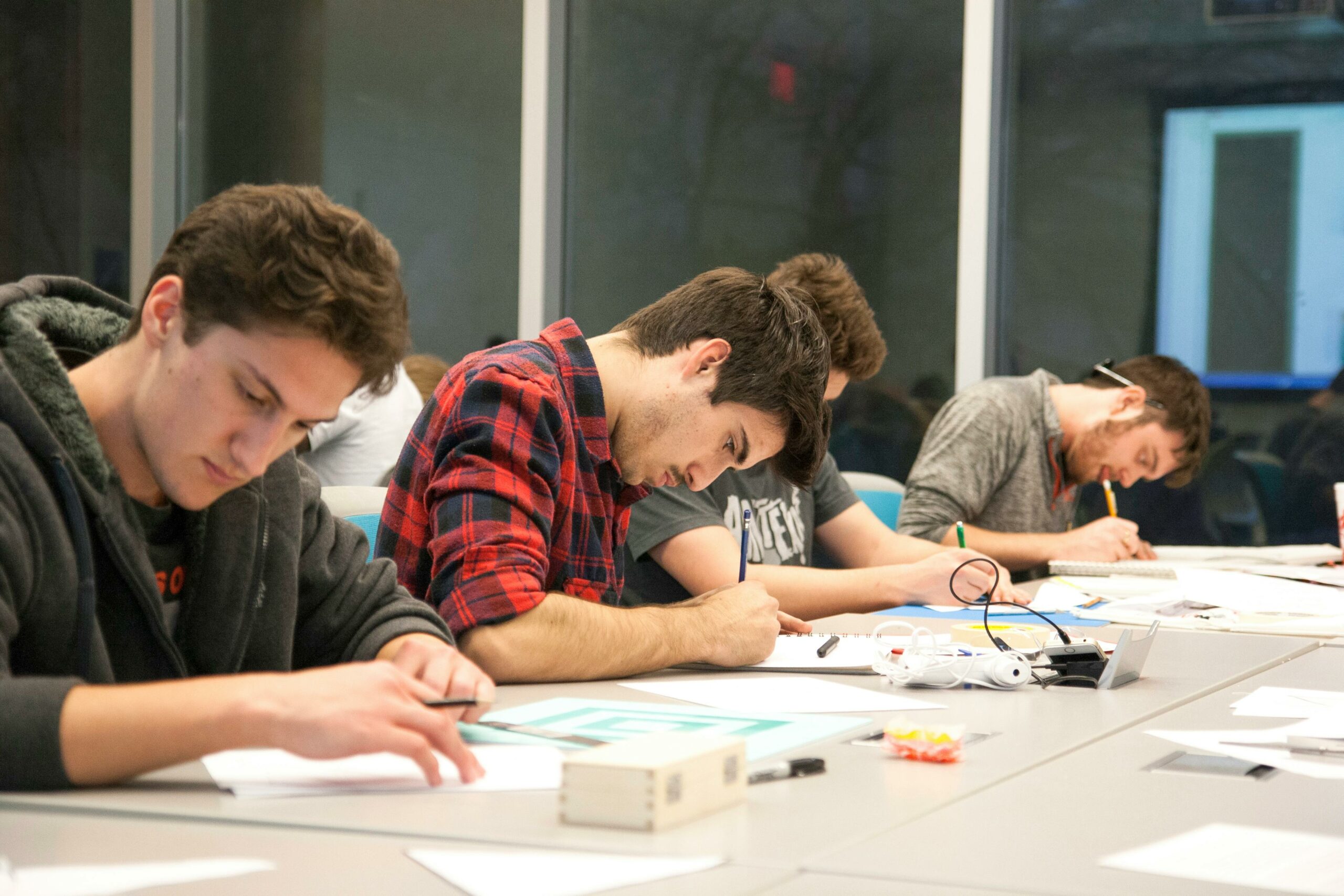Ace Your College Papers: Essay Writing Tips for International Students

Landing in a new country for college is like stepping onto a movie set – exciting, maybe a little confusing, and definitely a whole new world! You’re handling new classes, new friendships, and maybe even a new language.
Then BAM! The dreaded essay assignment hits your desk. Suddenly, academic writing feels like another mountain to climb. You might even wonder if there are shortcuts, perhaps turning to services like EssayWriters for expert help. However, mastering this skill yourself is incredibly rewarding and equips you for long-term academic success.
Alright, let’s break down this essay writing beast, shall we? It might seem intimidating, especially with potential language hurdles or just different academic expectations than you’re used to. But guess what? You absolutely can do this.
Source: https://www.pexels.com/photo/photo-of-men-sitting-by-the-table-while-writing-4514045/
Decode the Prompt
What is your professor really asking for? Read the essay prompt carefully. Like, really carefully.
Highlight keywords. What’s the main verb? Are you supposed to analyze, compare, argue, describe, or something else?
Sometimes, prompts in a new academic culture can feel vague or use terms differently than you expect. Don’t guess! If you’re unsure, ask your professor or a teaching assistant for clarification.
Seriously, they want you to understand. Double-checking the assignment details upfront always beats writing a stellar essay on the wrong track. This is one of the most crucial essay writing tips for students – start smart!
Brainstorm Like a Boss
Next up: Okay, you know the mission. Now, where do the ideas come from? Sometimes, staring at a blank page feels like staring into the abyss. Don’t panic! Your background as an international student is a superpower here. You have perspectives others don’t. Use them!
Try freewriting: just write whatever comes into your head about the topic for 10 minutes without worrying about grammar or structure.
Create a mind map, visually connecting ideas. Talk about the topic with classmates, friends, or even a tutor at the university writing center.
Getting those initial thoughts down, even messy ones, is key for effective student essay writing. Don’t filter yourself too much at this stage; just let the creativity flow.
Structure for Success
Now, let’s talk structure – the skeleton of your essay. While creative writing allows for more freedom, academic essays in most Western universities follow a pretty standard pattern.
Mastering these strategies for writing essays is essential. Create an outline before you start writing the full draft. Seriously, an outline keeps you focused and ensures your essay flows logically. So, what does that structure usually look like? Something like this:
- Introduction:
- Hook: Grab the reader’s attention.
- Background: Briefly introduce the topic.
- Thesis Statement: State your main argument clearly.
- Body Paragraph 1:
- Topic Sentence: Introduce the first supporting point.
- Evidence: Provide examples, quotes, data, etc.
- Analysis: Explain how the evidence proves your point here.
- Body Paragraph 2 (and 3, 4…):
- Repeat the structure above for each new supporting point.
- Conclusion:
- Quickly recap the key ideas you covered in the essay.
- Briefly hit the highlights of your main arguments.
- Give a quick rundown of the evidence or points you made.
Write in Clear and Concise English (It’s Okay Not to Be Shakespeare!)
Language hurdles? Aim for clarity, not complexity. Forget trying to sound like Shakespeare. Use clear, concise sentences. Focus on getting your point across accurately. Simple vocabulary used correctly is much better than fancy words used wrongly.
Pay attention to common grammar traps like subject-verb agreement, articles (a/an/the – oh, the horror!), and prepositions.
These practical essay writing tips make a huge difference. Don’t be afraid to use online tools like Grammarly, but remember they aren’t perfect – they’re assistants, not replacements for your own careful review.
Source: https://www.pexels.com/photo/woman-in-blue-long-sleeve-shirt-sitting-at-the-table-writing-8199557/
Avoid Accidental Plagiarism
Let’s chat about academic integrity – aka, not accidentally stealing ideas. Plagiarism is a huge no-no in academia. This is where citations come in.
You need to cite your sources whenever you quote directly, paraphrase (put someone else’s idea into your own words), or use specific data or information that isn’t common knowledge.
Different courses might require different citation styles (like MLA, APA, or Chicago). Make sure you know which one to use and follow it precisely.
When professors write essays for students’ evaluation, they expect original thought supported by properly credited sources.
So, what usually needs a citation?
- Direct quotes (using quotation marks)
- Paraphrased ideas or summaries of someone else’s work
- Statistics, data, or specific facts from a source
- Images, graphs, or charts created by others
- Unique theories or concepts from another author
Revise and Proofread (Don’t Skip This!)
Think you’re done once the first draft is written? You wish! Revision and proofreading are where the magic truly happens.
They are not the same thing. Revision is about the big picture: Is your argument clear? Does your evidence support your thesis? Is the structure logical? Does it actually answer the prompt?
Proofreading is about the details: spotting typos, grammar errors, punctuation mistakes, and citation issues.
This crucial step in essay writing for students requires fresh eyes. Take a break between writing and editing. Read your paper backward, sentence by sentence, to focus on mechanics. Better yet, ask a friend, tutor, or someone at the writing center to read it over.
Leverage University Resources
Finally, remember you’re not stranded on a deserted island with your essay! Universities offer tons of resources to help students succeed. Your university’s writing center is your best friend – they offer free tutoring and workshops.
Your professors have office hours – use them to ask questions about assignments or feedback. Librarians are research wizards who can help you find credible sources. International student services often have advisors familiar with the unique challenges you face.
Don’t be shy! Improving students essays is a collaborative process, and these support systems are there for you. Take advantage of them!
Wrapping It Up
So, there you have it – your survival kit for tackling college essays as an international student. It won’t always be easy, that’s true, but pushing through the hard stuff leads to major growth.
Remember to decode the prompt, brainstorm freely, structure logically, write clearly, cite meticulously, revise thoroughly, and use the amazing resources available to you. It might seem like a lot, but take it one step at a time.
You’ve already made the brave leap to study abroad; you absolutely have what it takes to conquer essay writing, too. You’ve got this.
Miss Clipping Out Stories to Save for Later?
Click the Purchase Story button below to order a print of this story. We will print it for you on matte photo paper to keep forever.

